About Talent Press and production with Raluca Mănescu
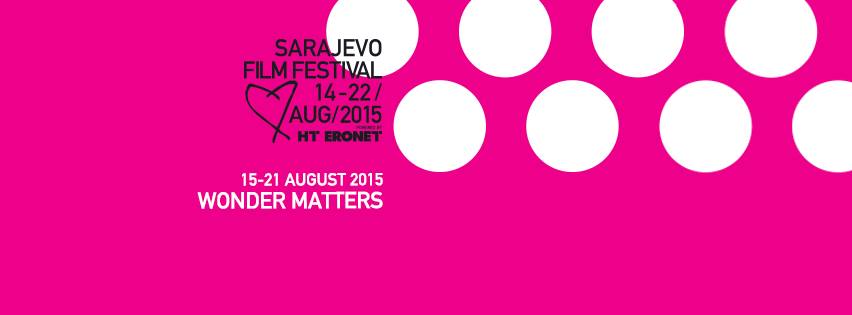
If you go to the Sarajevo Film Festival as a young film critic, in the Talent Campus programme, you might have the feeling that everything is a
teaser for the year to come, because there`s no time and you don’t get to see much of the selection, besides the films recommended for the Talents. You find yourself there to work and to get familiarized with the industry, hopefully a lot more than you already knew.
In short, I`ll try to introduce the programmes for Talents, starting with my experience at Talent Press and continuing with short interviews with the colleagues that were there from Romania. I`m talking about
Iulia Ciochină and
Sorin Dobrin (acting),
Seb Mihăilescu and
Anda Pușcaș (directing),
Ana-Maria Gheorghe,
Răzvan Badea and Ionuț Barbu (script writing),
Raluca Mănescu (production) and
Ana Drăghici (cinematography).
Sarajevo Film Festival 2015
The Sarajevo Film Festival that this year celebrated its 21st edition, came into being thanks to the initiative of the Obala Art Center in 1995, as an attempt to help rebuild the city which was still under siege at its first edition. From that moment until today the festival has grown and has become the most important festival in the South-Eastern Europe, with a varied films selection,
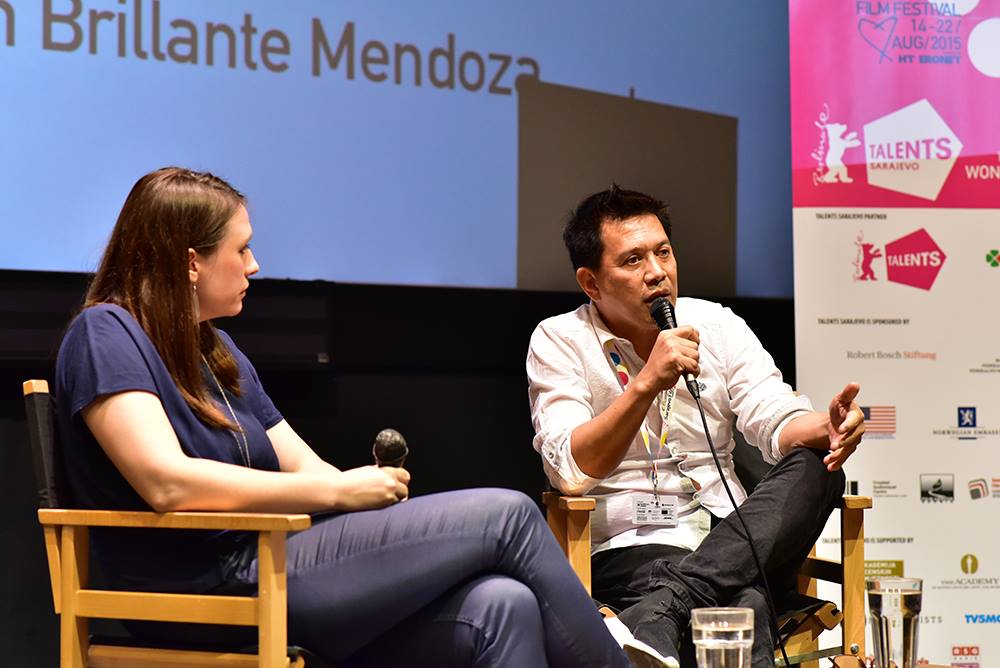
important guests and many events for the film industry which may offer the filmmakers from the region financing and projects development opportunities. The following platforms are very important: CineLink, Film Docu Rough Boutique, Sarajevo Film Fund, Minimarket. Sarajevo Talent Campus which is shaped after the homonym programme from Berlinale, with which it also has a partnership, is driven by the same motivation to contribute to the evolution of the cinema in the area. As Jovan Marjanović, Head of Industry, said in an interview for Fred.fm, it is somehow pretty simple; it is a chance for the young filmmakers to get to know each other, to know who they can work with and what are the instruments they can rely on.
The competition has three sections: feature film, short film and documentary and includes the films produced in the area (Albania, Armenia, Austria, Azerbaijan, Bosnia and Herzegovina, Bulgaria, Croatia, Cyprus, Greece, Georgia, Hungary, Kosovo, Macedonia, Malta, Moldova, Montenegro, Romania, Serbia, Slovenia, Turkey) that have their international, regional or worldwide premiere here. The films that were already well received in other festivals are programmed in the section
In Focus – for instance, I could see againRadu Jude`s
Aferim! here; other important films from outside the region enter the
Kinoscope section.
A Tribute to Brillante Mendoza included some of the titles of the Phillipino director and a conversation chaired by Vanja Kaluđerčić (in 2013 Cristi Puiu was the guest), and at Open Air Cinema many other films could be watched, besides the ceremony for presenting the actor Benicio del Toro the
Heart of Sarajevo award. I mentioned a few of the major sections of the festival, but the programme was a lot richer.
Sarajevo Talents
Already at the 9th generation of Talents, Sarajevo Talents is an educational programme for the young professional filmmakers in the region, with specific workshops for actors, script writers, producers, directors, directors of photography and film critics. Asja Makarević is the programme manager.
During one week many conferences with the invited professionals took place. Some of them were destined to a certain field, but they were opened to everyone from Talent Campus and if your schedule had allowed, you could have joined the scriptwriting workshop with Olivia Hetreed, Jan Forsströmmși Steve Mattews even if you were there as a director or having any other specialty.Many of the lectures were common, like the presentation for the Berlinale Talents for instance, which I had to skip because I was in the middle of the film criticism with Jurica Pavičič.
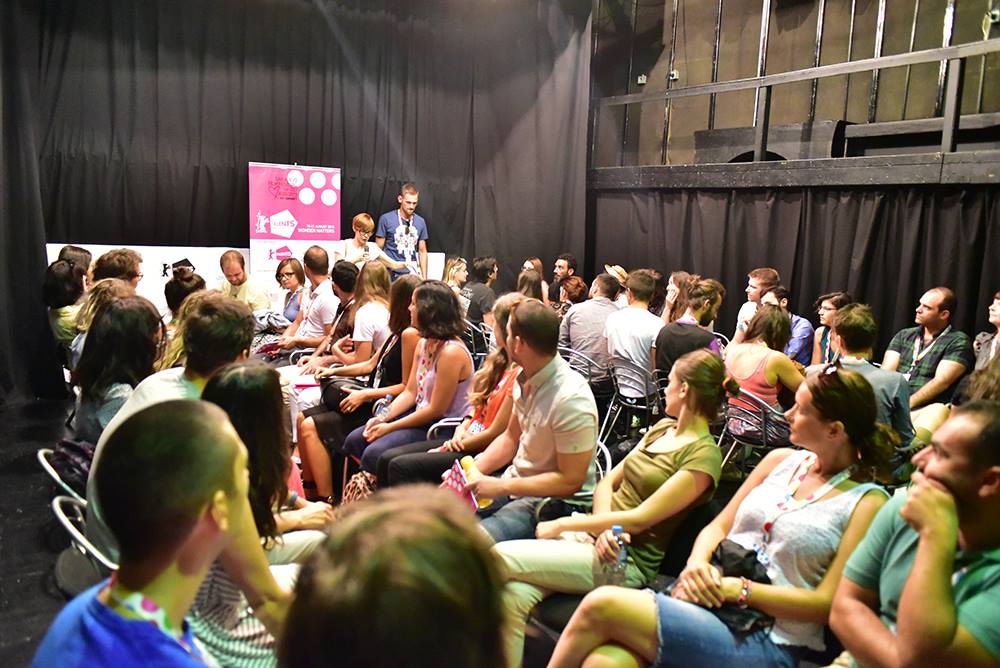
Not being able to join all the labs may be a problem, but if you are organized and you make from the beginning a schedule of what labs you want to join and what spare hours you have, might really help. It is true that sometimes I had no choice because I was taking part in the Film Studio and Camera Stage sessions for directors and directors of photography or I joined the separate screenings – in the Talent Press platform we had a different list of films and a completely different schedule.
The accreditation also allowed us to go watch other films, if the seats were not sold out, but otherwise, we received daily tickets for the
recommended screenings. Sometimes they were in strong connections with the conferences or with the homeworks we were supposed to make later on, or they were followed by Q&A sessions with the teams.
Carte Blanche: Shorts from Sundance was presented by Kim Yutani, who later on took part in a lecture about shorts, dedicated to the people from the Sarajevo Talents, together with other two programmers – Laurent Crouziex and Alice Kharoubi.
Son of Saul was followed by a case study with the director and scriptwriter, and
Trap was followed by the lecture with Brillante Mendoza.
Moreover, the selected talents, as directors or producers were able to sign up for the Pack&Pitch lecture for which Gabriele Brunnenmeyer și Selina Ukwuoma were the pitching trainers. Six of the participants learned how to present the project and in the end, they had an official pitch. Anda Pușcaș won the Best Pack & Pitch Award for the project
Sol, and received sound post-production services worth 4,000 Euros provided by studio Chelia. The other award, an invitation to CineLink`s Coproduction market was received by Ismet Kurtulus from Turkey.
I cannot describe conventionally the educational dimension of the Sarajevo Talents programme. There is a strong accent on
networking and especially on knowing each other, with common practical activities, doubled by the mentoring of some professionals whoexplain to us what the resources and the means you can count on when you start working on a project are.I don`t think you can fully learn everything in one week, but I think it is possible that this programme may widen a bit your perspective on things.
Sarajevo Talent Press
Wanting to find out what happens at Talent Press, I did a bit of research before coming here, talking to the young people that had been here in the past few years. The conclusion I reached is that every time there are slight differences. Basically the workshop includes master classes, lectures and pannel discussions, screenings, sometimes additional ones compared to the list of the other young people from ST and practical training sessions.I gave two short reviews (500 words) pretty soon, on the third day; then I re-wrote them after talking to our mentor.
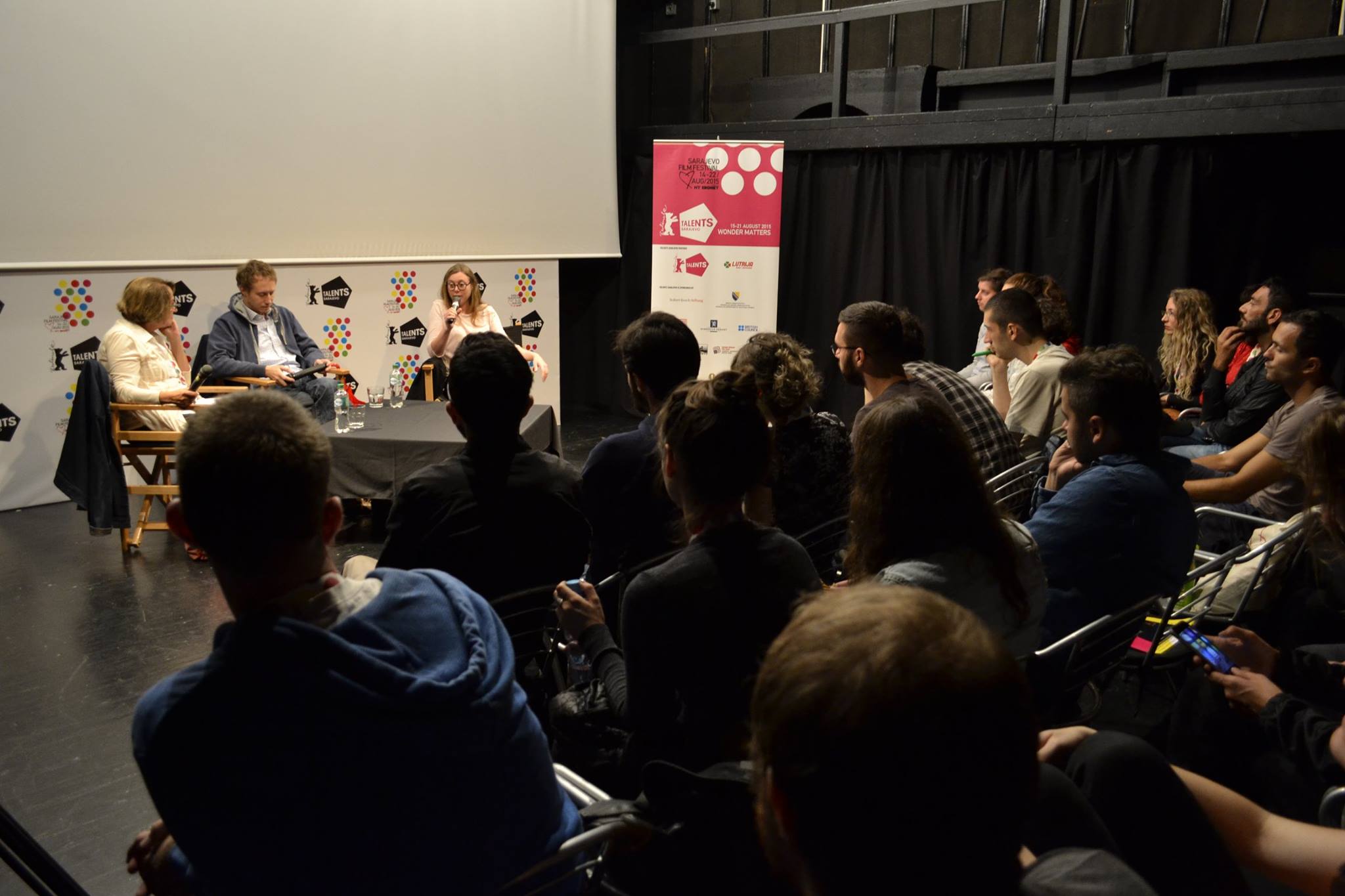
I had a group session, a film criticism lecture about reviews formats, opportunities and the future of our profession in the internet era and a private session. I was in the group working on the text with Jurica Pavičič. The other one had Giovanni Vimercati as the mentor. While working on the reviews, we talked specifically about what words would be more appropriate, about how it should be formatted so that it may be easier to follow and about where the idea could be emphasized. But what I think stayed with me afterwards is the importance that Jurica gives to the context, especially when you have to fit in a short format. I tend to prefer the review analysis that I believe is important, but I understand why it is good to find a balance between contextualizing and the stylistic interpretation part.
Separately, I also worked with Matt Micucci from Fred Film Radio; I took interviews with the Pack&Pitchparticipants for them and I also made an audio review of
Son of Saul, directed by László Nemes. Though it was much more fun to ask Benicio del Toro questions during his master-class. They gave us (from Talent Press) 10 minutes just for that.
Out of the discussions, some of them interested me more, some others, less. I enjoyed the case study with László Nemes and Clara Royer, the director and the co-screenwriter of
Son of Saul, very much. Besides the extensive research that they had made, Nemes gave us a detailed account of how he worked with the actors, how he speculated the personal tensions in the film narration, he told us about the long shots and about the difficulties he met while editing the film. Actually he was very accurate and technical in his speech, which I believe is very useful when the audience is made of filmmakers.
The HBO presentation,
Developing Stories in the Golden Age of European TV Drama, was very interesting as well. Two HBO producers, Steve Matthews and Antony Root explained how the quality of the series has been determined by favorable economic environment and by financial opportunities. They also talked much about how HBO Europe works and what their criteria for choosing some countries for original productions are, how they work with regional teams, etc.
Sarajevo Talent pentru producători:
Raluca Mănescu
Raluca graduated from UNATC Film Faculty in 2010, Media Department (Audiovisual, Communication, Scriptwriting and Film Studies).
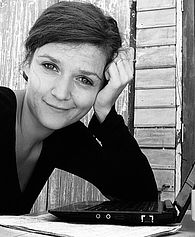
She also has a Masters Degree in film production, from the same school. Currently she is part of the Saga Film production team and she has just had the premiere of her first feature film, as scriptwriter. It is called
The World is Mine, it`s directed by Nae Tănase, with whom she has been working since her student years. Their famous collaborations are:
Zombie Infectors (2008),
Outrageously Disco (2010) and
12 minutes (2013); they are all pastiches of common genres.
The production workshop was somewhat different from the rest of the workshops because they didn`t have any mentors; instead they had more presentations with programmes from the industry. Raluca answered some of my questions about how things were for the producers, at Talent Campus.
How was the programme for you and what do you think it brought you in terms of know how or information?
Talents was not necessary a workshop for professional training; I cannot say I learnt many new information and I cannot consider it a milestone in my training. But it definitely was the place where I met a lot of people. The climate was great and the best thing for me is that I connected with many young producers from the neighboring countries. The schedule was quite generous, so that we had the time to enjoy many cups of coffee and many good conversations about the cinema and about the creative role of the film producer (who should also be a kind of a relationships psychologist)
From the time spent drinking coffee and talking, we got some know-how, regarding the way each of us does his/ her job in our country and what we would like to change in the industry and - and since we got to know each other and to like each other - what we could do together from now on. Actually, from my point of view, this is the great value of the Talent Campus: it created a spirit of adventure common to the young producers from Romania, Bulgaria, Macedonia, Serbia and Turkey.
Which of the four production workshops you thought to be most important?
The one called “Tiny Miracles” and not only because of the title. It was a master-class led by Ewa Puszczynska, the producer of
Ida, the Pawel Pawlikowski`s film, winner of the Oscar for Best Foreign Film in 2015. Puszczynska told us many subtle details about the way the film had been financed and she told us about the small battles she had to fight as a producer, as well as the strategies she chose to use. Finally, it was interesting for me to see in her eyes the decision and the desire to do something that truly counts. What she told us was almost like a motivational speech before a fight, thing that I believe filled us all with lots of energy.
One of the most important events for the industry was CineLink. Could you, please, explain how this platform works and how it can help you as a producer?
Every year CineLink is very important for the industry. It is the place where, if you have a good project, you can come and pitch, hoping that you will find other partners (international co-producers), or, if settled connections fail to take shape, you can at least hope to be seen and to be part of the networking. I believe these are the most important advantages you can get as a producer – you get to know people, you test the market, you get to see if other producers, sales agents, distributors, festival directors may be interested in the subject / topic of your film.
And last, but not least, you can also win prizes in money, awarded by financing institutions from the industry (Arte, Eurimages). This year, for example, at the CineLink market, 3 Romanian projects were pitched: Cristina Groșan`s
A coat of gold, Radu Dragomir`s
The Professor and Ivana Mladenovic`s
Soldiers, which won the jury prize. Even more, at the “CineLink Work in Progress” 2 other Romanian projects were pitched: Catrinel Danaiata`s
Double and Adrian Sitaru`s
Fixeur, which was received an award.
Detalii:
Sarajevo Film Festival //
Sarajevo Talents FB If you go to the Sarajevo Film Festival as a young film critic, in the Talent Campus programme, you might have the feeling that everything is a teaser for the year to come, because there`s no time and you don’t get to see much of the selection, besides the films recommended for the Talents. You find yourself there to work and to get familiarized with the industry, hopefully a lot more than you already knew.
If you go to the Sarajevo Film Festival as a young film critic, in the Talent Campus programme, you might have the feeling that everything is a teaser for the year to come, because there`s no time and you don’t get to see much of the selection, besides the films recommended for the Talents. You find yourself there to work and to get familiarized with the industry, hopefully a lot more than you already knew. important guests and many events for the film industry which may offer the filmmakers from the region financing and projects development opportunities. The following platforms are very important: CineLink, Film Docu Rough Boutique, Sarajevo Film Fund, Minimarket. Sarajevo Talent Campus which is shaped after the homonym programme from Berlinale, with which it also has a partnership, is driven by the same motivation to contribute to the evolution of the cinema in the area. As Jovan Marjanović, Head of Industry, said in an interview for Fred.fm, it is somehow pretty simple; it is a chance for the young filmmakers to get to know each other, to know who they can work with and what are the instruments they can rely on.
important guests and many events for the film industry which may offer the filmmakers from the region financing and projects development opportunities. The following platforms are very important: CineLink, Film Docu Rough Boutique, Sarajevo Film Fund, Minimarket. Sarajevo Talent Campus which is shaped after the homonym programme from Berlinale, with which it also has a partnership, is driven by the same motivation to contribute to the evolution of the cinema in the area. As Jovan Marjanović, Head of Industry, said in an interview for Fred.fm, it is somehow pretty simple; it is a chance for the young filmmakers to get to know each other, to know who they can work with and what are the instruments they can rely on. Not being able to join all the labs may be a problem, but if you are organized and you make from the beginning a schedule of what labs you want to join and what spare hours you have, might really help. It is true that sometimes I had no choice because I was taking part in the Film Studio and Camera Stage sessions for directors and directors of photography or I joined the separate screenings – in the Talent Press platform we had a different list of films and a completely different schedule.
Not being able to join all the labs may be a problem, but if you are organized and you make from the beginning a schedule of what labs you want to join and what spare hours you have, might really help. It is true that sometimes I had no choice because I was taking part in the Film Studio and Camera Stage sessions for directors and directors of photography or I joined the separate screenings – in the Talent Press platform we had a different list of films and a completely different schedule.
 She also has a Masters Degree in film production, from the same school. Currently she is part of the Saga Film production team and she has just had the premiere of her first feature film, as scriptwriter. It is called The World is Mine, it`s directed by Nae Tănase, with whom she has been working since her student years. Their famous collaborations are: Zombie Infectors (2008), Outrageously Disco (2010) and 12 minutes (2013); they are all pastiches of common genres.
She also has a Masters Degree in film production, from the same school. Currently she is part of the Saga Film production team and she has just had the premiere of her first feature film, as scriptwriter. It is called The World is Mine, it`s directed by Nae Tănase, with whom she has been working since her student years. Their famous collaborations are: Zombie Infectors (2008), Outrageously Disco (2010) and 12 minutes (2013); they are all pastiches of common genres.